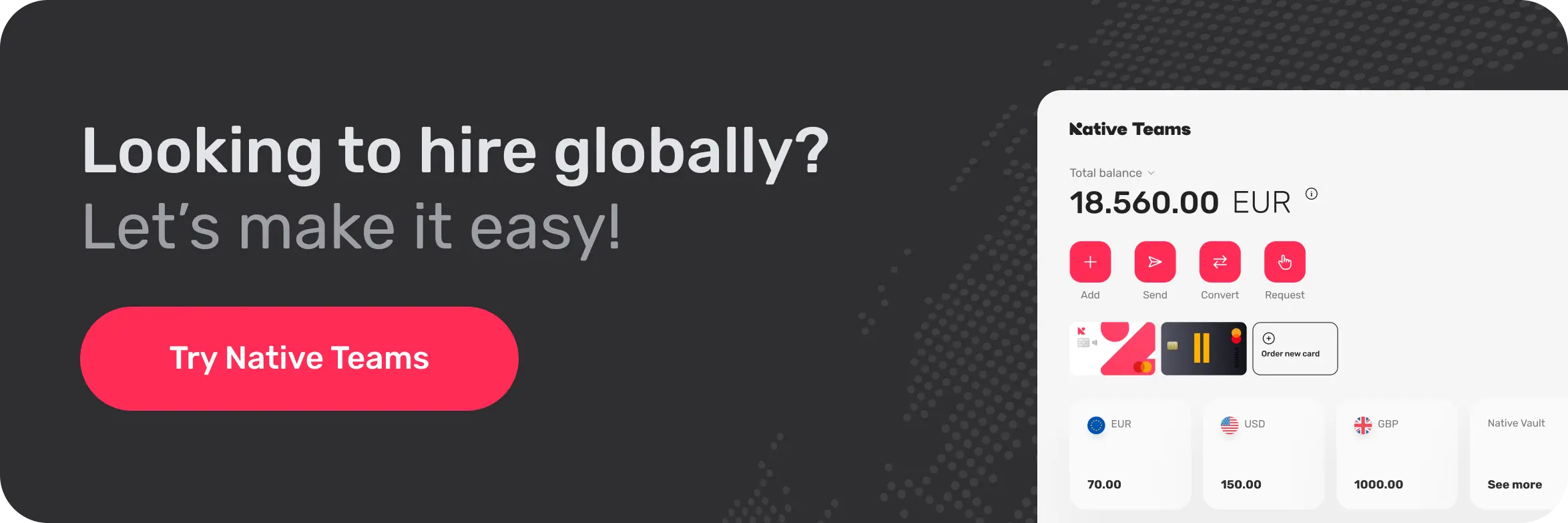
Employment
Legal employment for your global team
EOR (Employer of Record)
Your global team, locally employed
Entity Management
Set up and manage entities
HR, Payroll & Benefits
Manage all admin tasks from one place
Global Employee Benefits
Premium benefits for your global team
Relocation and Visa
Relocate your team anywhere
Employment Contracts
Localised employment contracts
Employment Contract
Employment contract is vital for setting clear expectations, reducing disputes, and ensuring compliance with local labor laws—especially in international or remote hiring scenarios.



Back to Glossary
What is an employment contract?
An employment contract is a formal agreement between an employer and an employee that outlines the terms and conditions of the working relationship. It can be written, verbal, or implied, but a written contract offers the most clarity and legal protection for both parties. This document sets clear expectations, helps prevent disputes, and ensures compliance with local labour laws.
Why is an employment contract important?
An employment contract plays a crucial role in defining the responsibilities, rights, and obligations of both parties. For employers, it provides legal security, reduces misunderstandings, and supports consistent HR practices. For employees, it offers transparency around job role, pay, benefits, and working conditions, ensuring they understand what is expected of them and what they are entitled to receive.
What are the key elements of an employment contract?
Employment contracts have some key components that you have to consider when drafting one for employment purposes. These include job descriptions, title, salary, benefits, working hours and more.
Job title and description
Clearly outlines the employee’s role, duties, and reporting lines, helping to avoid scope creep and role confusion.
Salary and benefits
Details the base salary, payment frequency, bonuses, commissions, and any employee benefits such as health insurance, pension contributions, or allowances.
Explore how Native Teams’ Payroll Management solution can help streamline salary processing.
Working hours
Specifies expected working hours per day or week, along with any overtime policies and flexibility clauses.
Contract type
Indicates whether the agreement is permanent, temporary, freelance, or part-time, which influences entitlements and notice periods.
Termination conditions
Outlines the conditions under which the contract can be terminated, including notice periods, grounds for dismissal, and severance pay if applicable.
Confidentiality and non-compete clauses
Protects the employer’s intellectual property and competitive position by restricting disclosure of sensitive information and post-employment competition.
Leave policies
Includes details on annual leave, sick leave, parental leave, and public holidays, in accordance with local regulations.
Other terms to consider
Additional elements can include probation periods, dispute resolution mechanisms, and relocation clauses, depending on the nature of the role.
Types of employment contracts
There are various types of employment contracts that you can find when hiring employees. Here are the most common types of contracts:
Permanent contracts
These are open-ended agreements with no predefined end date, typically offering full benefits and long-term job security.
Fixed-term contracts
Set for a specific period or project duration, these contracts automatically expire at the end of the term unless renewed.
Casual contracts
Used for irregular or on-call work with no guaranteed hours, often offering flexibility but fewer benefits.
Freelance or contractor agreements
Common for independent professionals, these contracts outline project-based or short-term work arrangements and differ legally from employment contracts.
Read more about how to hire freelancers compliantly on our blog.
Other variations
Depending on the jurisdiction and nature of the job, there may also be part-time, internship, zero-hours, or seasonal contracts with unique terms.
Is an employment contract legally required?
In many countries, having a written employment agreement is a legal requirement. Even in jurisdictions where it isn’t mandatory, a formal contract is strongly recommended to protect both parties. The specific legal obligations vary based on the local employment laws where the work is performed or the company is registered.
For companies hiring globally, Native Teams’ Employer of Record service ensures all employment contracts comply with local laws and regulations.

Can an employer change the terms of an employment contract?
Generally, employers cannot unilaterally change the terms of an employment contract without employee consent. Any modifications—such as changes in salary, job duties, or working hours—must be agreed upon by both parties and documented through a contract amendment or new agreement. Failing to do so could result in legal disputes or claims of constructive dismissal.
Get free employment contract templates with Native Teams!
Need help drafting compliant and professional employment agreements? Native Teams offers free employment contract templates for multiple countries and contract types, including:
- UK employment contract template
- Portugal employment contract template
- Turkey employment contract template
Whether you're hiring a full-time team member or a contractor abroad, Native Teams provides compliant solutions to hire, pay, and manage global teams with confidence.